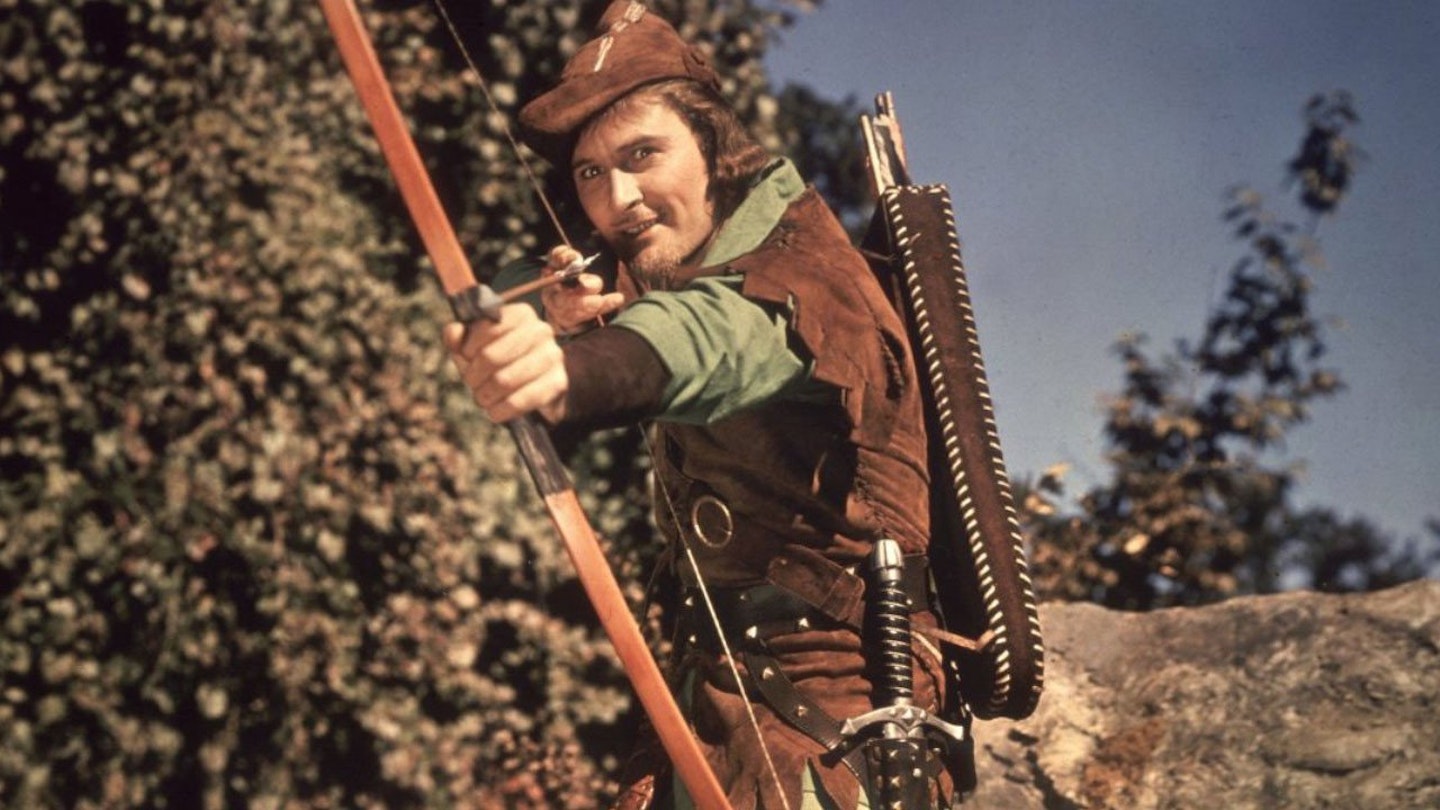The outlaw Robin Hood, who stole from the rich to give to the poor, was an established English folk-figure by 1377, when he was mentioned in William Langland's poem Piers Plowman. His legend inspired scores of mediaeval ballads, most importantly the epic collection A Lytell Geste Of Robyn Hode (1510). That Robin was a contemporary of King Richard The Lion-Hearted (1157-99) and his brother King John (1167-1216) was suggested in the 14th century and is the premise of Anthony Munday's plays The Downfall Of Robert, Earl Of Huntingdon and The Death Of Robert, Earl Of Huntingdon (both 1601) and Sir Walter Scott's Ivanhoe (1819).
The character was appearing in films as early as 1908, when there were competing American and British movies, Robin Hood and Robin Hood And His Merry Men respectively. Douglas Fairbanks starred in a hugely expensive Robin Hood in 1922, an early blockbuster featuring pageantry, the Crusades, a vast castle set and typically athletic stuntwork. The silent epic was so well remembered that no studio thought it worth considering another version for a decade and a half, until Warner Brothers employee Dwight Franklin, an advisor on the period details of Captain Blood (1935), sent studio head Jack L. Warner a memo saying, "Don't you think Cagney would make a swell Robin Hood?" It might seem an absurd suggestion now, but James Cagney had just played Bottom in A Midsummer Night's Dream (1935) and Warners, alongside the gangster pics, was working up a sideline in swashbucklers.
Michael Curtiz's Captain Blood established Errol Flynn (a replacement for the unavailable Robert Donatt) as an action-romance-adventure star, and showed that the no-nonsense, all-action Warners style played as well on the Spanish Main as it did in tommy-gun turf wars down on the East Side. Warner thought Franklin's suggestion sound and bought the rights to several Hood-related properties and scripts. He then assigned writer Rowland Leigh to work on a screenplay. It wound up substantially rewritten by many hands and was finally credited to Norman Reilly Raine and Seton I. Miller.
Along the way, Cagney left the studio in a contract dispute and the just-breaking Flynn landed what would become his signature role. And with Flynn on board, Olivia de Havilland and Basil Rathbone (respectively, the star's love interest and duelling partner from Captain Blood) were shoo-ins for Maid Marian and Sir Guy Of Gisbourne. David Niven wasn't available for Will Scarlet so the forgettable Patric Knowles got the gig. But the remainder of the Merry Men and the Norman dastards were perfectly cast: bluff Alan Hale as Little John, croaky Eugene Pallette as Friar Tuck and cockney Herbert Mundin as Much The Miller's Son. And ranged against this motley band, a sly, suggestive ("any more complaints about the new tax from our Saxon friends?") Claude Rains as Bad Prince John.
Shooting began in 1937 under the direction of William Keighley, with costly Technicolor marking this as a significant step up from previous Warner action pics. But the production fell behind schedule and Curtiz stepped in to finish the movie, which bears no trace of the awkward hand-over. Regardless of Richard Todd (who donned the green tights in 1952), a cartoon Fox for Disney, Richard Greene and Michael Praed on television or Kevin Costner and Patrick Bergin in competing 1991 projects, Errol Flynn remains the definitive Robin Hood (not yet the American-pronounced Robinhood).
Our hero struts magnificently in dayglo lime pantyhose, tosses back his goateed head to laugh in the face of danger and clambers nimbly up the ivy to woo the lovely de Havilland (whose peachy complexion is as good an ad for Technicolor as her stars seemed to be having so muc fun waving a sword or kissing a girl. But Flynn could also muster the requisite gravitas when stirrir the Men of Sherwood to revolt QJ abusing the rightful king (Ian Hunter) for abandoning England to the mercies of Rotten John.
Flynn's Robin brawls light-heartedly with his friends (both Little John and Friar Tuck get the best of him in their initial encounters) and seriously with his enemies (he's so decent he gives Rathbone back his sword when he loses it in the climactic fight, though seconds later bad boy Basil is reaching for a treacherous dagger in a clinch).
The secret of Flynn's heroism is that few movie Erich Wolfgang Korngold score that makes John Williams sound like Leonard Cohen on a rainy day; stuntwork that integrates perfectly into the cut-and-thrust of the dialogue and a subliminal contemporary relevance (for John and the Normans read Adolf and the Nazis) all add up to a universal declaration that rulers should take lessons from rogues.
